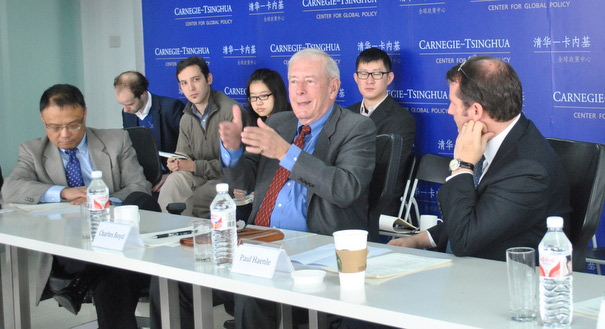{
"authors": [
"Matt Ferchen",
"Charles Boyd",
"Paul Haenle",
"Han Hua"
],
"type": "event",
"centerAffiliationAll": "",
"centers": [
"Carnegie Endowment for International Peace",
"Carnegie China"
],
"collections": [
"China’s Foreign Relations",
"U.S.-China Relations"
],
"englishNewsletterAll": "",
"nonEnglishNewsletterAll": "",
"primaryCenter": "Carnegie Endowment for International Peace",
"programAffiliation": "",
"programs": [],
"projects": [],
"regions": [],
"topics": [
"Security",
"Arms Control"
]
}
China-U.S. Security Relations
Mon, October 29th, 2012
Beijing
IMGXYZ4088IMGZYXMilitary cooperation remains one of the most sensitive points of collaboration between the United States and China. However, with continued instability in Afghanistan and Pakistan; piracy in the Southeast Asian seas; and terrorism in Central Asia, all on the rise, U.S-China collaboration is a practical necessity to overcome these pressing global threats.
Carnegie-Tsinghua’s Paul Haenle hosted a roundtable discussion with Charles G. Boyd, a retired four star general of the United States Air Force, and U.S. and Chinese scholars on joint military efforts between the two countries and how best to expand cooperation, mutual understanding, and two-way transparency.
China’s Military Worldview
China, participants agreed, was undergoing a process of domestic transformation, and its national security policy was driven by a self-reinforcing set of factors including a consistent sense of insecurity and historical grievance in relation to the west.
- The Capabilities Gap: A Chinese scholar pointed out that even after two decades of rapid military modernization, China’s People’s Liberation Army (PLA) recognized a significant gap in military capabilities between itself and the United States. This, the scholar added, contributed to an inward-looking, insecure mentality that led national security policy to focus on domestic development. An American scholar countered that China’s multinational companies, in their engagement with Africa and Latin America, presented a more assertive face of Chinese interests abroad, with strategic policy lagging behind these largely commercial investments.
- A Difference in Historical Perspectives: An American expert reminded scholars that the history of U.S.-China relations was viewed very differently by the two countries. Whereas China tended to connect the United States to a larger narrative of imperial domination and “humiliation,” the U.S. view only went back to 1971 and President Nixon. The matter of “sovereignty,” the expert added, on issues such as the Diaoyu/Senkaku Islands, were therefore interpreted very differently by China, whose larger historical perspective gave additional impetus to view U.S. involvement with suspicion. A Chinese scholar concurred, and said that this sense of “historical grievance” was one of the cornerstones of the PLA’s view of the world.
- China’s Response to the U.S. Pivot: An American expert commented that ‘Pivot’ was a poor choice of words for the shift in U.S. strategy to China and Asia, but admitted that part of the reason it was mainly directed at the U.S. domestic audience and indicated turning over a new page, so to speak, after two wars in the middle-east. Another American expert added that U.S. national security policy was still too euro-centric and that the pivot was “twenty years overdue.” From a military perspective, one of the scholars said that a lot of U.S. senior military officials had little experience in Asia, and the ramifications of the pivot would take time to solidify.
Strengthening Military to Military Links
- The PLA’s Identity Crisis: A Chinese scholar said that the PLA was best understood as an extension of the Communist Party, and is a subordinate mechanism of the Party’s rule. The scholar pointed out that part of the PLA’s reaction to the U.S. pivot was relief that a large share of the military budget was now guaranteed.
- Direct Engagements: One Chinese scholar described recent attempts, not always successful, by senior U.S. military officials to forge direct links and relationships with their PLA counterparts. An American expert speculated that the need to speak via translators prevented a sense of informality that was essential for closer ties. A European expert countered by pointing out that social codes between the organizations were vastly different, and an informal gathering raised the question of how ground rules would be decided. All the American participants raised possibilities for Chinese military officials to be posted on exchange to military schools in Europe and the United States.
- Impersonal Politics: An American expert pointed out that sometimes, leaders have to “go outside the protective gathering of people around them” to make a significant impact with their counterparts in other nations. Maybe China's future leaders, the expert commented, could rise above the country’s famous reticence. A Chinese participant responded by noting that power was “impersonal” in China. The political system did not encourage any assertion of “personality,” the participant added, and leaders were not encouraged to be spontaneous orators, and were therefore reluctant to talk off-the-record, or on-the-spot.
Discussants: Jeff Moon, Han Hua, David Mulrooney, Xie Tao, Zhu Feng
Carnegie does not take institutional positions on public policy issues; the views represented herein are those of the author(s) and do not necessarily reflect the views of Carnegie, its staff, or its trustees.
Event Speakers
Ferchen specializes in China’s political-economic relations with emerging economies. At the Carnegie–Tsinghua Center for Global Policy, he ran a program on China’s economic and political relations with the developing world, including Latin America.
Charles Boyd
Paul Haenle held the Maurice R. Greenberg Director’s Chair at the Carnegie Endowment for International Peace and is a visiting senior research fellow at the East Asian Institute, National University of Singapore. He served as the White House China director on the National Security Council staffs of former presidents George W. Bush and Barack Obama.
Han Hua
Han Hua is an associate professor at Peking University and director of the Center for Arms Control and Disarmament in the university’s School of International Studies.

